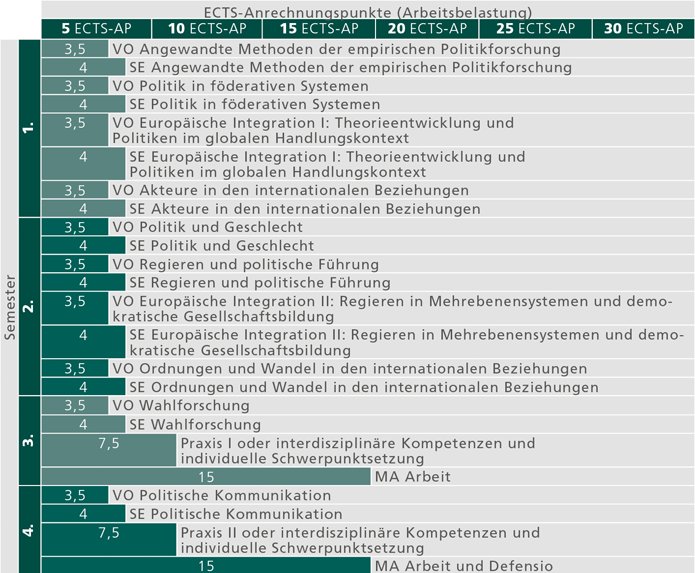Masterstudium Politikwissenschaft: Europäische und internationale Politik
Curriculum (2014W)
Ab dem Wintersemester 2024/2025 darf eine Zulassung zu diesem Studium nur nach dem neuen Curriculum erfolgen.
Master of Arts
Dauer/ECTS-AP
4 Semester/120 ECTS-AP
Studienart
Vollzeit
Unterrichtssprache
Deutsch
Voraussetzung
Bachelorabschluss/Äquivalenter Abschluss und Sprachnachweis
Fakultät
Fakultät für Soziale und Politische Wissenschaften
Niveau der Qualifikation
Master (2. Studienzyklus)
ISCED-11: Stufe 7, EQR/NQR: Stufe 7
ISCED-F
0312 Politikwissenschaft und politische Bildung
Studienkennzahl
UC 066 824
Das Curriculum ist die Grundlage eines Studiums und vermittelt einen detaillierten Überblick zum Aufbau, zum Inhalt, zur Prüfungsordnung und zum Qualifikationsprofil.
Mittels Curriculum können mehrere wichtige Fragen bereits vor Studienbeginn geklärt werden: Welche Zulassungsvoraussetzungen gelten für das Masterstudium Politikwissenschaft: Europäische und internationale Politik, wie lange dauert das Studium, welche Module müssen absolviert werden etc.
Für das Masterstudium Politikwissenschaft: Europäische und internationale Politik gilt aktuell das Curriculum 2014W.
Informationen zum Curriculum (2014W)
Die Gesamtfassung des Curriculums spiegelt das aktuell gültige Curriculum wider, ist rechtlich unverbindlich und dient lediglich der Information. Die rechtlich verbindliche Form des Curriculums inkl. etwaiger Änderungen finden Sie in den entsprechenden Mitteilungsblättern.
Die Information, welche Curriculumsversion für Sie gilt, entnehmen Sie bitte Ihrem Studienblatt
abrufbar unter: https://lfuonline.uibk.ac.at/public/lfuonline_meinestudien.studienblatt
Spalte: Curriculum in der geltenden Fassung
- Curriculum/Gesamtfassung (ab 01.10.2019)
- Mitteilungsblatt vom 28.06.2019, 67. Stück, Nr. 592 (Änderung des Curriculums)
- Curriculum/Gesamtfassung (ab 06.10.2014)
- Mitteilungblatt vom 06.10.2014, 2. Stück, Nr. 5 (Berichtigung des Curriculums)
- Mitteilungsblatt vom 06.08.2014, 43. Stück, Nr. 591 (Berichtigung des Curriculums)
- Mitteilungblatt vom 27.06.2014, 34. Stück, Nr. 538
Voraussetzung
Fachlich infrage kommendes Bachelorstudium an der Universität Innsbruck:
Nachweis der Allgemeinen Universitätsreife:
Die allgemeine Universitätsreife für die Zulassung zu einem Masterstudium ist durch den Abschluss eines fachlich in Frage kommenden Bachelorstudiums, eines anderen fachlich in Frage kommenden Studiums mindestens desselben hochschulischen Bildungsniveaus an einer anerkannten inländischen oder ausländischen postsekundären Bildungseinrichtung oder eines im Curriculum des Masterstudiums definierten Studiums nachzuweisen. Zum Ausgleich wesentlicher fachlicher Unterschiede können Ergänzungsprüfungen (maximal 30 ECTS-AP) vorgeschrieben werden, die bis zum Ende des zweiten Semesters des Masterstudiums abzulegen sind. Das Rektorat kann festlegen, welche dieser Ergänzungsprüfungen Voraussetzung für die Ablegung von im Curriculum des Masterstudiums vorgesehenen Prüfungen sind.
Im Zuge des Nachweises der Allgemeinen Universitätsreife wird jedenfalls die Absolvierung folgender Kernbereiche im Rahmen des abgeschlossenen Bachelorstudiums geprüft:
- 10 ECTS-AP aus dem Kernbereichen Angewandte Methoden der Sozialwissenschaften und Statistik
- 5 ECTS-AP aus dem Kernbereich Europäische Integration
- 5 ECTS-AP aus dem Kernbereich Vergleich Politischer Systeme
- 5 ECTS-AP aus dem Kernbereich Internationale Politik
- 5 ECTS-AP aus dem Kernbereich Politische Theorien
- 5 ECTS-AP aus dem Kernbereich Politische Kommunikation und Wahlforschung
Empfohlener Studienverlauf
Der unten angeführte, exemplarische Studienverlauf gilt als Empfehlung für Vollzeitstudierende, die das Studium im Wintersemester beginnen. Die Aufstellung dient der Darstellung eines möglichen Studienablaufs und ist nicht verpflichtend. Etwaige Prüfungswiederholungen bzw. deren studienzeitverzögernde Wirkung sind nicht berücksichtigt.
Die Regelstudienzeit beträgt 4 Semester bzw. 120 ECTS-AP, wobei gemäß Universitätsgesetz die Arbeitsbelastung eines Studienjahres 1.500 (Echt-)Stunden zu betragen hat und dieser Arbeitsbelastung 60 Anrechnungspunkte zugeteilt werden (ein ECTS-Anrechnungspunkt entspricht einer Arbeitsbelastung der Studierenden von 25 Stunden).
3,5 ECTS-AP: VO Angewandte Methoden der empirischen Politikforschung
4,0 ECTS-AP: SE Angewandte Methoden der empirischen Politikforschung
3,5 ECTS-AP: VO Politik in föderativen Systemen
4,0 ECTS-AP: SE Politik in föderativen Systemen
3,5 ECTS-AP: VO Europäische Integration I: Theorieentwicklung und Politiken im globalen Handlungskontext
4,0 ECTS-AP: SE Europäische Integration I: Theorieentwicklung und Politiken im globalen Handlungskontext
3,5 ECTS-AP: VO Akteure in den internationalen Beziehungen
4,0 ECTS-AP: SE Akteure in den internationalen Beziehungen
3,5 ECTS-AP: VO Politik und Geschlecht
4,0 ECTS-AP: SE Politik und Geschlecht
3,5 ECTS-AP: VO Regieren und politische Führung
4,0 ECTS-AP: SE Regieren und politische Führung
3,5 ECTS-AP: VO Europäische Integration II: Regieren in Mehrebenensystemen und demokratische Gesellschaftsbildung
4,0 ECTS-AP: SE Europäische Integration II: Regieren in Mehrebenensystemen und demokratische Gesellschaftsbildung
3,5 ECTS-AP: VO Ordnungen und Wandel in den internationalen Beziehungen
4,0 ECTS-AP: SE Ordnungen und Wandel in den internationalen Beziehungen
3,5 ECTS-AP: VO Wahlforschung
4,0 ECTS-AP: SE Wahlforschung
7,5 ECTS-AP: Praxis I oder interdisziplinäre Kompetenzen und individuelle Schwerpunktsetzung
15,0 ECTS-AP: MA Arbeit
3,5 ECTS-AP: VO Politische Kommunikation
4,0 ECTS-AP: SE Politische Kommunikation
7,5 ECTS-AP: Praxis II oder interdisziplinäre Kompetenzen und individuelle Schwerpunktsetzung
15,0 ECTS-AP: MA Arbeit und Defensio

| Semester | ECTS-AP | Titel |
|---|---|---|
Informationen zur Prüfungsordnung inkl. Bewertung und Benotung
Prüfungsordnung
Die Prüfungsordnung ist integraler Bestandteil des Curriculums, detaillierte Informationen finden Sie unter dem Paragrafen Prüfungsordnung.
Bei der Notenverteilungsskala handelt es sich um die statistische Darstellung der Verteilung aller positiv absolvierten Prüfungen, die innerhalb eines Studiums bzw. eines Studienfaches (unter Heranziehung aller gemeldeten Studierenden eines Studiums bzw. eines Studienfaches) erfasst wurden. Die Notenverteilungsskala wird in regelmäßigen Abständen aktualisiert.
| Österreichische Notenskala | Definition | %-Satz | ||
| 1 | SEHR GUT | 42,3 | = 100% | |
| 2 | GUT | 31,5 | ||
| 3 | BEFRIEDIGEND | 17,4 | ||
| 4 | GENÜGEND | 8,8 | ||
| 5 | NICHT GENÜGEND |
März 2025
Gesamtbeurteilung der Qualifikation
Nicht zutreffend
Erklärung: Eine Gesamtbeurteilung (mit Auszeichnung bestanden, bestanden, nicht bestanden) wird nur über eine studienabschließende Prüfung, die aus mehr als einem Fach besteht, vergeben (im Curriculum dieses Studiums ist diese nicht vorgesehen).
Formulare
- Praxisvereinbarung
- Prüfungsprotokoll
- Anmeldung der Masterarbeit
- Beurteilung des Pflichtmoduls: Vorbereitung Masterarbeit
- Deckblatt der Masterarbeit
- Antrag um Zulassung zur dritten und vierten Wiederholung einer Lehrveranstaltungsprüfung
Formulare und Ablauf der Einreichung der Masterarbeit (gültig seit 01.11.2023)
Anerkennungen
- Ansuchen um Anerkennung von Prüfungen UND Beiblatt
ACHTUNG: Füllen Sie bitte das Formular "Ansuchen um Anerkennung von Prüfungen" UND das "Beiblatt" aus!
Kontakt und Information
Prüfungsreferat
Standort Universitätsstraße 15
Studienbeauftragter
Ass.-Prof. Dr. David Munck Willumsen
Studiendekan (ab 01.03.2024)
Univ.-Prof. Dr. Wilhelmus Johannes Gerardus Uunk
